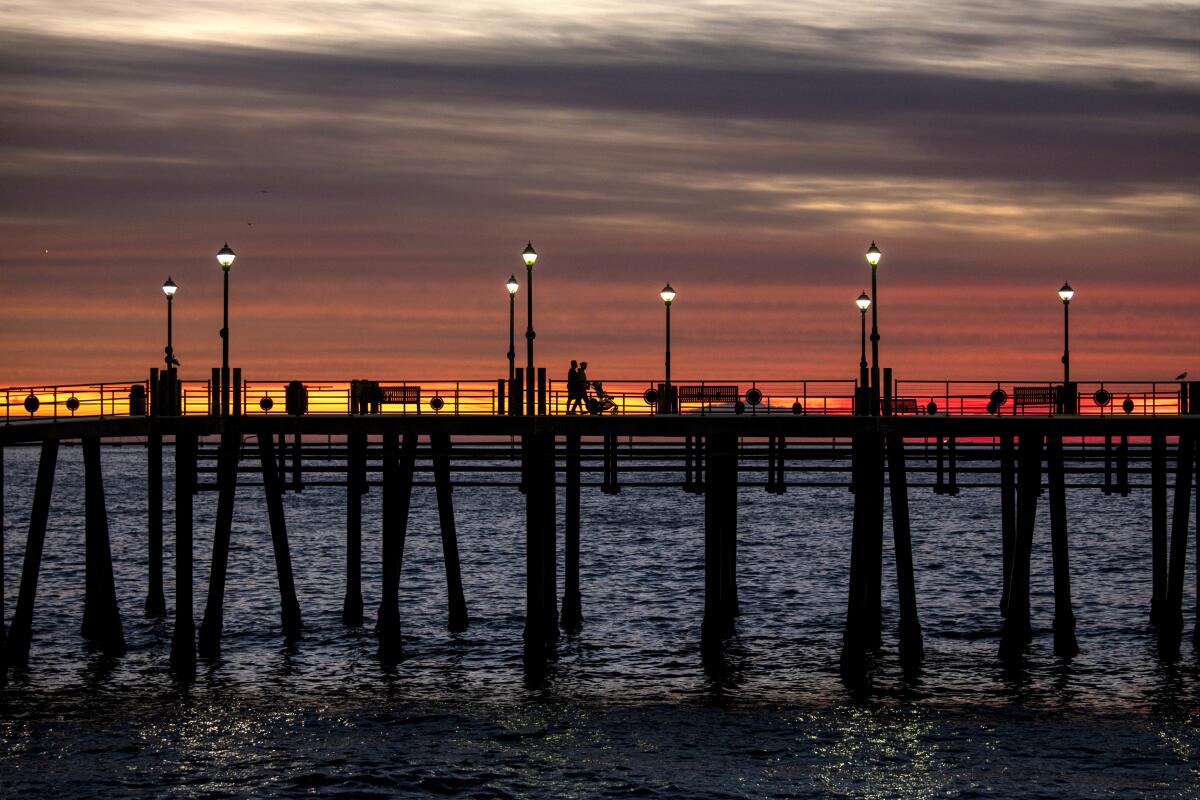L.A. beaches aren’t just for white people

- Share via
Before armed police officers approached her on July 29, Luz Maria Flores felt safe. She was wearing a breeze-tousled bun and soaking in the sun with her younger sister on the Redondo Beach Pier.
The UCLA graduate has post-traumatic stress disorder, which causes anxiety, but she had brought her Xoloitzcuintle, a Mexican hairless dog, named Yare, who is a service animal for her PTSD.
The pier is diverse, with Mexicans, Filipinos and others fishing mariscos to feed their families. Others rest on fold-out chairs, boomboxes blasting Latin beats. Children eat churros and play.
Opinion Columnist
Jean Guerrero
Jean Guerrero is the author, most recently, of “Hatemonger: Stephen Miller, Donald Trump and the White Nationalist Agenda.”
Some white locals openly complain about the waterfront, calling it “scary” and “not reflective of Redondo Beach’s demographics.”
But it has long felt like home to Flores, 30, who identifies as a Black Latina. Flores has visited from South L.A. since childhood. Her Mexican parents went on early dates there. “That place did represent joy and love and family to me,” she told me. “Now I can’t look at it the same.”
That evening, Flores was arrested for having Yare on the pier. The city bans dogs there, but people regularly flout the rule without consequence, and the code doesn’t apply to service dogs. Flores says she told officers that Yare is a service dog. The police chief doesn’t dispute that.
Flores was also jailed on charges of resisting or obstructing police after declining to show her ID and accusing officers of profiling her. Her sister, 25, was arrested and charged with resisting. Both deny wrongdoing.
Conservatives support “colorblind” laws because they keep white people in power.
Video of the incident from the sisters’ phones shows the legs of a white pedestrian who is backing away with a dog. “Go tell her something!” Flores tells the police officers, who remain fixated on Flores. Criticizing their behavior as “f— racist,” she observed: “There’s literally other white people here with their dogs and I get stopped!”
She repeatedly asks if she can leave. They say no. An officer tells her to relax, but she remains shaken. She has lost friends to police violence. She has studied overpolicing. An officer says she’s “10 seconds” from going to jail. “I don’t feel welcome and I don’t feel safe!” she cries.
An officer says she’s under arrest. She’s handcuffed and on the ground. Her sister Nancy, 25, a doctoral student who was visiting from New Mexico, was also arrested. “I was standing on the sidelines recording,” she told me. “They were hurting my sister, they were hurting her dog, so I went to grab Yare, her dog, and one of the police officers grabbed me.”
Their bail was $10,000 each; they were released the next morning after their father paid a percentage. Their arraignment is in a few weeks.
Some viewers may blame Flores because she was, at points, irreverent. But we live in a world where white people can shout and curse at cops without a reaction, where police kill people of color with impunity.
As a UCLA student, Flores was a researcher on Million Dollar Hoods, a university project to examine mass incarceration in Los Angeles County and beyond. Its data show people of color are disproportionately jailed; some beach cities are worse than inland areas.
Kelly Lytle Hernández, a UCLA professor and lead researcher on Million Dollar Hoods, recalls Flores as “a very hardworking, highly intelligent, very empathetic, very committed student.”
“Gordita Chronicles” canceled. “Batgirl” killed off before she even appeared. This is not what progress looks like.
She couldn’t watch the full video because it was disturbing. But, Hernández said, “I hear both courage and fear in the voice of my student. I hear her trying to stand up for her dignity and her rights.”
Flores was previously arrested at a Black Lives Matter protest in 2015. She plans to attend law school and become a civil rights attorney. “They will not break my spirit,” she said.
Only 10 dog-walking citations have been issued at the pier this year, Redondo Beach Police Chief Joe Hoffman told me. To his knowledge, nobody else has been arrested in those incidents.
He said a review of longer body-camera videos from Flores’ arrest leaves him feeling that officers acted “professionally,” in compliance with the law. Asked if he didn’t think they escalated the situation by having so many officers confront Flores, Hoffman said he believes it was “appropriate based on the conflict that was occurring.”
He added that the department is open to reviewing any complaint from Flores.
“If we ever become aware of some sort of bias-based policing,” he said, “we would take immediate action because it cannot be tolerated at this Police Department or anywhere else.”
Redondo Beach is next door to Torrance, where the Police Department is under investigation by the California attorney general. Officers there exchanged racist text messages, including about killing Black suspects.
People of color have long been treated as intruders on L.A. County’s beaches, excluded by racist housing policies, pay inequities and white terror. In surfing, exclusion wears the mask of “localism,” which claims waves for coastal residents — mostly white and wealthy.
North of Redondo Beach, in Manhattan Beach, several Black surfers have endured the N-word and other hate speech. Kavon Ward, who led the successful effort to restore Bruce’s Beach there to its rightful Black owners, told me she decided to move out after her advocacy prompted slurs and threats against her. “The city is still in so many ways telling Black people they’re not welcome,” she told me.
Arrests of Latino street vendors in Santa Monica send a similar message: that the coast belongs to white people.
There’s no simple way to puncture that delusion. But we know the police play a role in maintaining it — by unfairly singling out individuals like Flores and denying them the right to protest.
If racist policing persists, Torrance may not be the only police department in the area to find itself under embarrassing scrutiny.
More to Read
A cure for the common opinion
Get thought-provoking perspectives with our weekly newsletter.
You may occasionally receive promotional content from the Los Angeles Times.













